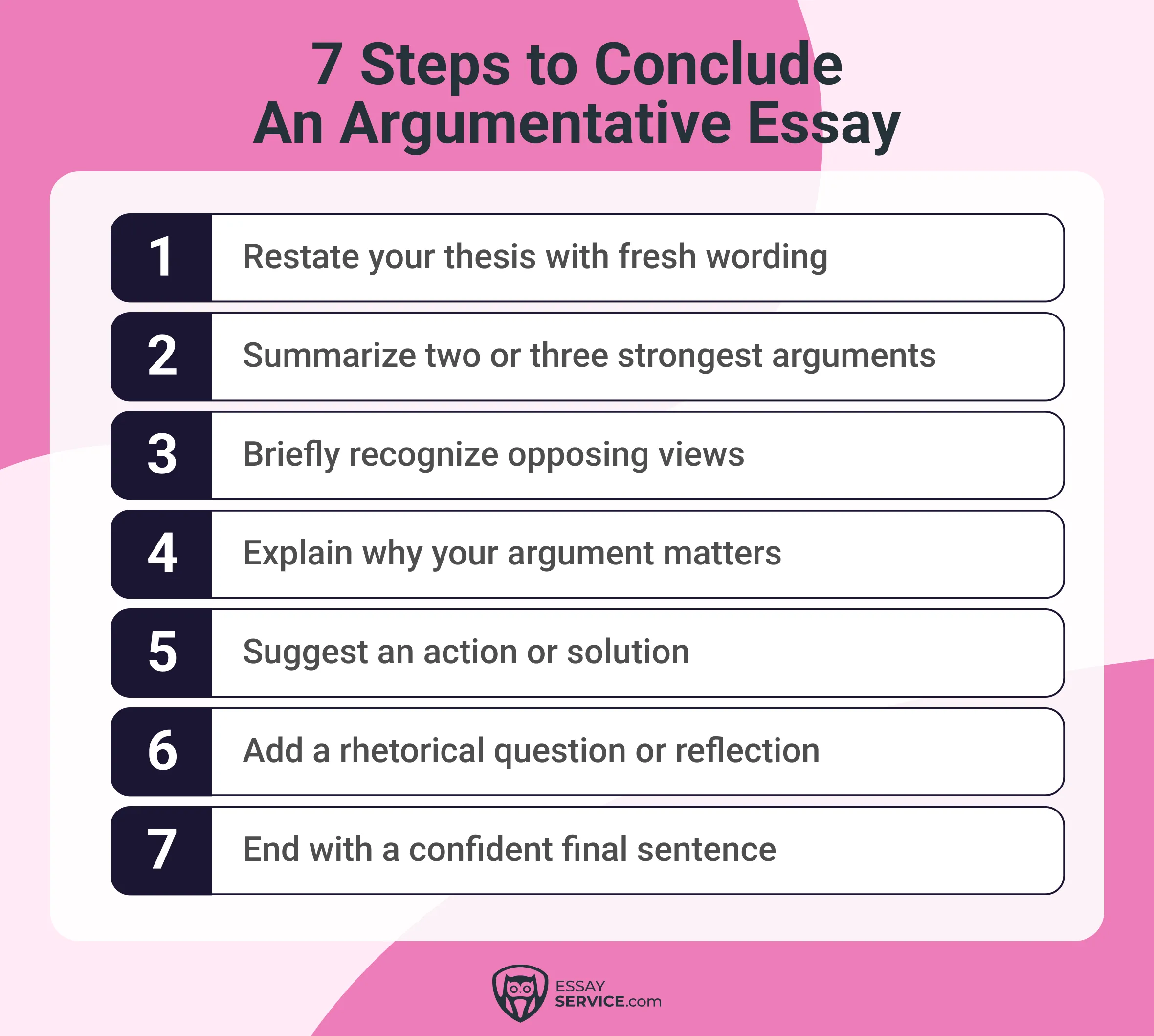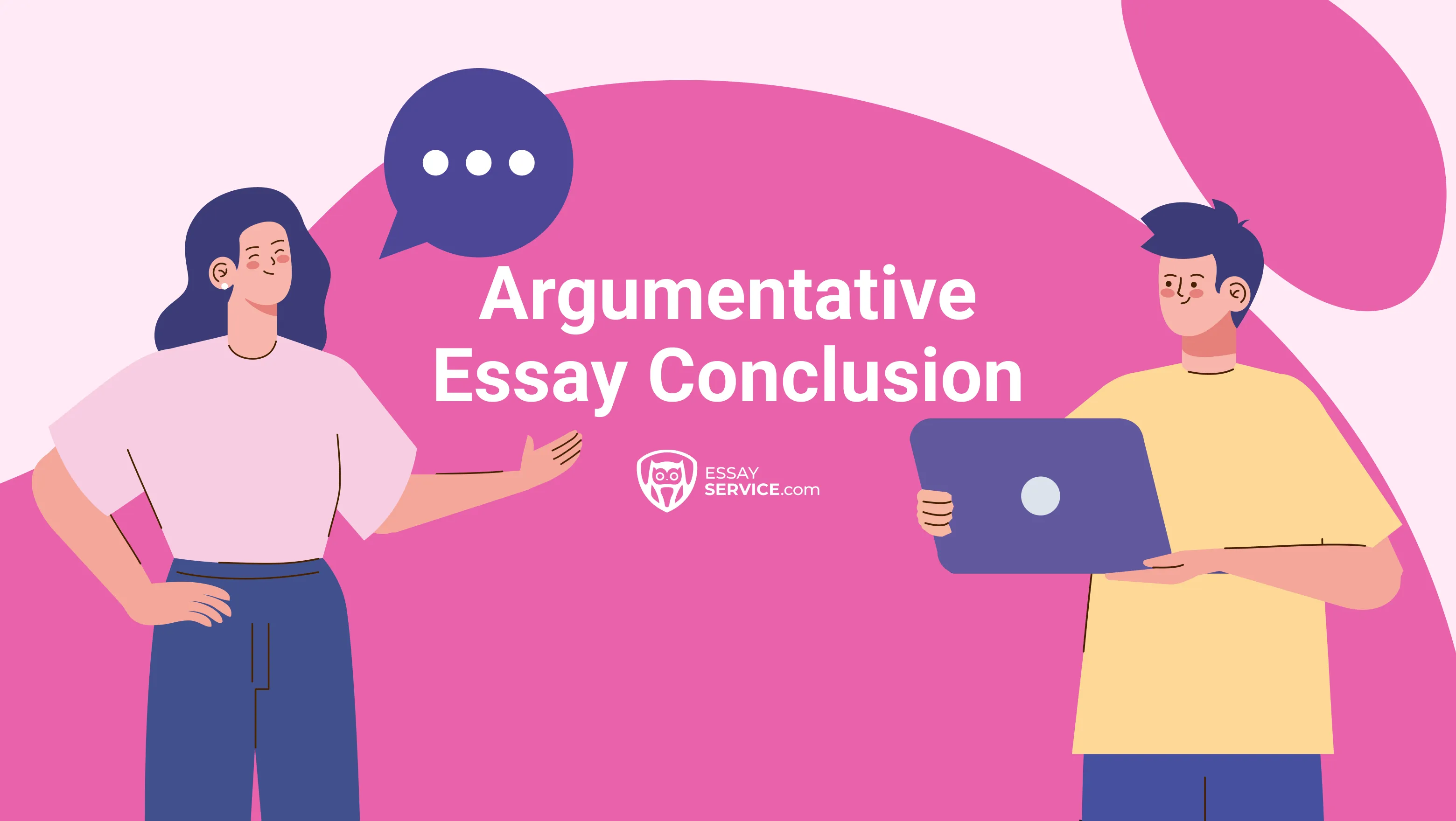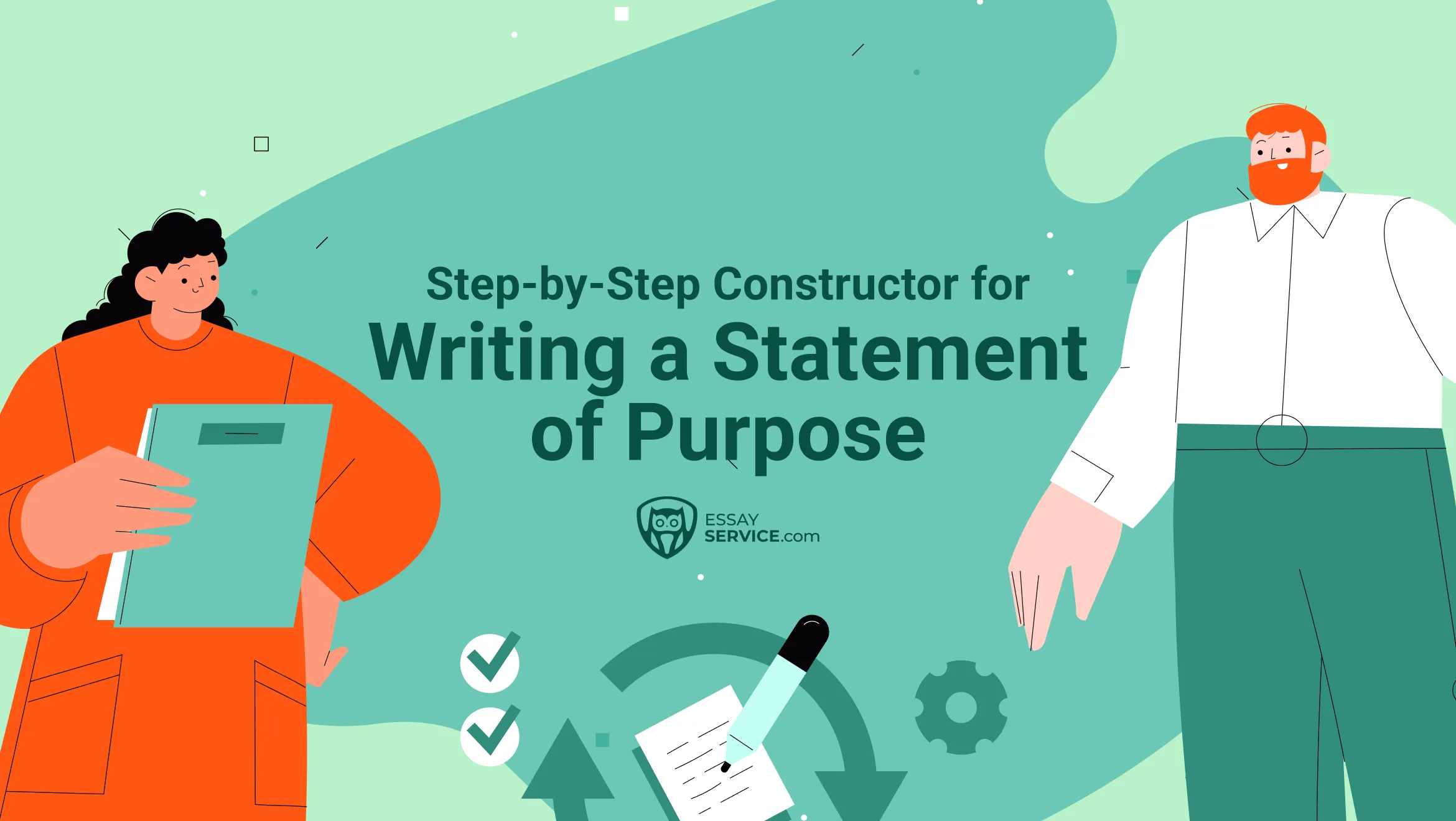Are you tired of staring at a blank page, unsure of how to wrap up your argumentative essay effectively? You're not alone. Writing a conclusion can be challenging, but fear not! By mastering a few simple techniques, you can leave your readers with a lasting impression that reinforces your main points and leaves them thinking.
In this article, our argumentative essay writing service explains the art of creating the perfect ending for your paper. So, without further ado, let's delve into some valuable tips and illustrative examples for your next endeavor.
How to Conclude an Argumentative Essay in 7 Steps
A good conclusion doesn’t merely signal that the paper is ending. It’s the point where your reasoning matures into understanding. By the time a reader reaches your conclusion paragraph, they’ve followed your logic across claims, evidence, and counterpoints. Now, the task is to reveal what all of that movement has built toward.

1. Restate Your Thesis with Fresh Insight
When you circle back to the thesis, evolve it. Your conclusion should demonstrate how the argument has evolved, not just repeated itself. If your original claim argued that school uniforms improve focus and reduce peer pressure, a more insightful restatement might look like: Uniforms turn attention from comparison to learning, creating classrooms defined by purpose rather than appearance. Notice how this version shifts focus from result to meaning, from what uniforms do to why it matters.
2. Highlight Your Strongest Arguments
In an effective conclusion paragraph for an argumentative essay, your role shifts from builder to curator. Rather than re-laying every brick, select the pieces that bear the most weight, two or three arguments that carry the core of your reasoning. What do these points reveal when seen together? What new geometry forms from their alignment?
3. Acknowledge Counterarguments Gracefully
To conclude an argumentative essay with credibility, gesture toward the tension your paper wrestled with. Acknowledging counterarguments in your closing lines signals confidence and demonstrates that your position can withstand scrutiny.
You might write: While some argue that enforcing uniforms limits expression, the deeper question isn’t about fabric; it’s about focus. Uniformity in dress can free individuality in thought. Here, the counterpoint isn’t dismissed but reframed.
4. Answer the ‘So What?’ Question
Every conclusion for argumentative essay writing must face this quiet but persistent echo: Why does this matter? The body of your essay has proven that your claim is valid; the conclusion must show that it’s valuable.
So what does it mean that uniforms improve focus? Perhaps it means that education gains a measure of equity, that distraction gives way to discipline, and students begin meeting each other in the mind rather than in the mirror. When you trace your argument to its broader implications, you lift it from circumstance into principle.
5. Suggest a Call to Action or Practical Step
To end your argumentative essay is to leave readers with momentum, not finality. A call to action can be an invitation to reimagine behavior, policy, or perspective. What should shift because of what’s been proven? What next step flows naturally from this understanding?
For instance, an essay about digital minimalism in schools might close with: Educators and families can treat attention like a shared resource. Here, the call isn’t forceful but reflective, turning insight into gentle responsibility.
6. Add a Thoughtful Closing Device
A good conclusion for an argumentative essay benefits from a parting spark, a rhetorical device that nudges the reader to linger. This could be a question that opens a new mental doorway, a quotation that reframes your theme, or a brief reflection that pulls the argument inward.
For instance: If classrooms are mirrors of society, what lessons might equality in attire teach about equality in opportunity? Such a question enlarges it, not undoes it, offering the mind one more thread to follow.
7. Finish with a Confident Final Sentence
Your last line is the essay’s afterimage. In your argumentative conclusion paragraph, aim for clarity wrapped in calm authority. Avoid filler transitions like 'in conclusion' or 'to sum up'; the reader already feels the landing. Instead, end on a statement that sounds firm and reflective.
You might write: When learning stands above comparison, every student finds room to grow. This is the kind of sentence that feels less like closure and more like composure.
Strong Conclusion in Argumentative Essay Examples
Now, let's take a look at some real-life examples to drive home the points we've been discussing. The illustrations below showcase the strategies we've outlined on how to write a good conclusion for an argumentative essay. These good conclusion examples will give you a better sense of how to apply these techniques in your own writing.
Argumentative Essay Conclusion Example 1
- Thesis Statement: 'Mandatory vaccination policies are essential for protecting public health.'
- Conclusion: 'To summarize, while debates surrounding individual rights and government mandates may continue, the evidence overwhelmingly supports the efficacy and necessity of mandatory vaccination policies. By ensuring high vaccination rates, we can effectively prevent the spread of deadly diseases and safeguard the well-being of vulnerable populations. It's imperative that policymakers prioritize public health initiatives based on scientific evidence to protect our communities from preventable outbreaks.'
Argumentative Essay Conclusion Example 2
- Thesis Statement: 'The criminalization of homelessness exacerbates social inequality and undermines human rights.'
- Conclusion: 'In summary, punitive measures targeting homeless individuals only perpetuate cycles of poverty, marginalization, and despair. Instead of criminalizing homelessness, we must prioritize compassionate, evidence-based solutions that address the root causes of homelessness and provide support services to those in need. By investing in affordable housing, mental health resources, and social services, we can create communities that uphold the dignity and rights of all individuals, regardless of their housing status.'
Conclusion Template for Argumentative Essay
Here’s a simple, flexible way to wrap up your essay. Each part guides the reader back through your main ideas, showing how they fit together. Just replace the brackets with details from your own writing.
- Restate the Thesis: It’s clear that [restate your thesis in your own words: same core idea, new phrasing], which shows why [main topic or issue] matters.
- Integrate Key Arguments: As the essay has shown, [list 2–3 of your strongest points briefly]. Together, they make a clear case for [your main position].
- Suggest Broader Implications: This topic reaches beyond [specific context] and highlights how [main issue] affects [bigger picture, like society, education, daily life]. It reminds us that ideas like these shape [broader consequence].
- End with a Call to Action or Reflection: Looking ahead, [propose a next step, question, or action] so that [desired outcome or change] becomes possible.
How to Format the Conclusion Paragraph for Argumentative Essay
Formatting the conclusion of your argumentative essay is just as important as crafting its content. Here are some key elements to consider when structuring your ending:
Formatting the Conclusion Paragraph
Good formatting helps your conclusion feel complete. Keep it simple and consistent so nothing distracts from your final point:
- Alignment: Left-align for a clean, readable layout.
- Font: Choose a clear, academic style like Times New Roman or Arial.
- Size: Use 12-point text for balance.
- Spacing: Double-space for breathing room.
- Indentation: Start with an indent to mark the new paragraph.
Structuring the Conclusion Paragraph
When deciding how to write a conclusion paragraph for an argumentative essay, focus on flow, not just form. The right structure helps your last words feel steady and complete:
- Paragraph Length: Aim for a few tight sentences that pull everything together without drifting off course.
- Logical Flow: Let one thought lead to the next, circling back to your main argument naturally.
- Transitions: Use gentle connectors so your ideas move smoothly, not abruptly.
- Emphasize Readability: Keep sentences clear and calm so the reader can absorb your final point with ease.
Argument Styles to Conclude Argumentative Essay
There’s no single way to close an argument. The tone and shape of your argumentative essay conclusion paragraph should follow the kind of reasoning you’ve used throughout. You can follow one of the three main styles:
Classical (Aristotelian) Style:
If your essay was built on firm logic and clear persuasion, end with strength. Bring your thesis back with fresh conviction and leave your reader with one final push, like a reason to act, agree, or think again. The tone here is steady and sure, the kind that makes the reader nod rather than question.
Rogerian Style:
If your essay aimed for understanding, let the ending feel like a handshake. Show where different sides meet, point to shared goals, and suggest a path that works for both. Keep your voice warm and fair, the kind that invites trust instead of tension.
Toulmin Style:
If your essay leaned on careful evidence, finish with quiet confidence. Restate your claim, gather your strongest proof, and admit where questions remain. You’re showing that good thinking leaves room for honesty.
Common Conclusion Mistakes to Avoid
- Steer Clear of Adding New Information: Your conclusion isn't the place to introduce fresh arguments or evidence. Stick to summarizing what you've already covered in your essay to maintain clarity and focus.
- Avoid Parroting the Introduction: While it's fine to revisit your thesis and main arguments, don't simply repeat what you've said in the introduction. Instead, offer a fresh perspective or insight that adds depth to your argument.
- Be Specific, Not Vague: Keep your language precise and avoid generalizations. Being too vague can dilute the impact of your conclusion, so strive for clarity and specificity.
- Don't Forget Counterarguments: Acknowledge opposing viewpoints, even if briefly, to demonstrate a well-rounded understanding of the issue. Ignoring counterarguments can make your ending seem biased and weak.
- Undermining your Argument: Don’t shrink back from your own ideas. Phrases like 'I could be wrong' or 'This is just what I think' make your reasoning sound unsure. You’ve built your case, so trust it.
- Ending Abruptly: A sudden stop can leave the reader hanging. Take a moment to pull your main ideas together and leave one clear thought behind. A strong finish feels steady, not cut short.
Conclusion Checklist
Before you finish, check these points to make sure your argumentative essay conclusion paragraph feels strong and complete.

I’ve restated my thesis in a fresh way
I’ve brought back my strongest arguments
I’ve mentioned counterarguments briefly
I’ve shown why my topic matters
I’ve linked my claim to a bigger issue
I’ve kept my tone confident and clear
I haven’t added new information
I’ve kept the flow smooth
I’ve concluded with a strong final line that shows I know how to end an argumentative essay.
Final Thoughts
A conclusion written for an argumentative essay should show what all you’ve said so far adds up to, not simply echo what the reader has already found out. Your main job is to combine every argument into a single, clear picture and remind the reader of the topic’s importance.
If a concluding paragraph argumentative essay pulls you back, or any other part of the essay for that matter, you can count on EssayService at all times. With our support, it’ll be easier to close your paper confidently.
Frequently Asked Questions
What Is a Good Conclusion for an Argumentative Essay?
A good conclusion for an argumentative essay restates the thesis statement in a completely new way, reminds the reader of your key points, and closes with a sentence showing the significance of your argument.
What Are Common Conclusion Mistakes?
The most common mistakes include simply repeating the introduction, adding brand-new arguments that don’t belong, using vague phrases like “in conclusion,” or ending abruptly without leaving readers with a clear final impression.
Can a Conclusion Be 5 Sentences?
Yes, a conclusion can absolutely be five sentences. Many strong conclusions fall within that range because it’s long enough to restate the thesis and highlight key points.
Which Statement Best Describes the Conclusion of an Argumentative Essay?
The conclusion is the essay’s final note. It ties ideas together, shows what the reasoning led to, and gives the reader a clear sense that the discussion has reached its natural end.
What Should Be in the Conclusion of an Argumentative Essay?
An argumentative essay conclusion consists of a restated thesis, main points summarized, a brief mention of opposing views, and a bigger picture.

Anna has been helping students become more productive learners for 20+ years now. Her experience, combined with a Master’s degree in psychology, ensures her blog posts contain only valuable insights.
- Cuyamaca College Tutoring Center. (n.d.). How to write a good conclusion. Cuyamaca College. https://www.cuyamaca.edu/student-support/tutoring-center/files/student-resources/how-to-write-a-good-conclusion.pdf
- Columbus City Schools. (n.d.). Argumentative essay outline. Columbus City Schools. https://www.ccsoh.us/cms/lib/OH01913306/Centricity/Domain/207/Argumentative%20Essay%20Outline.pdf
- Bay Atlantic University. (2023, May 24). How to write an argumentative essay. Bay Atlantic University. https://bau.edu/blog/how-to-write-an-argumentative-essay/
New posts to your inbox
Your submission has been received!



